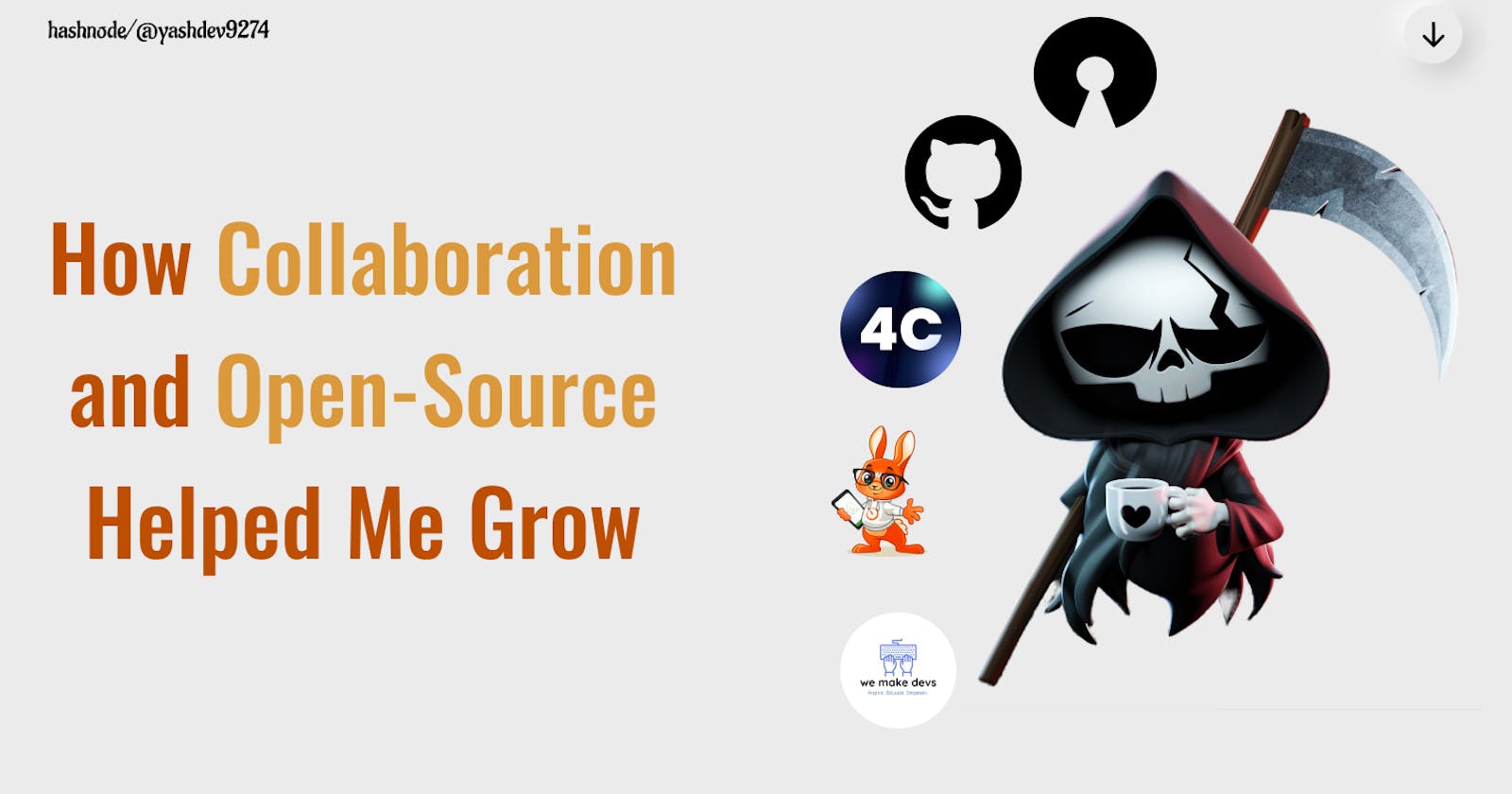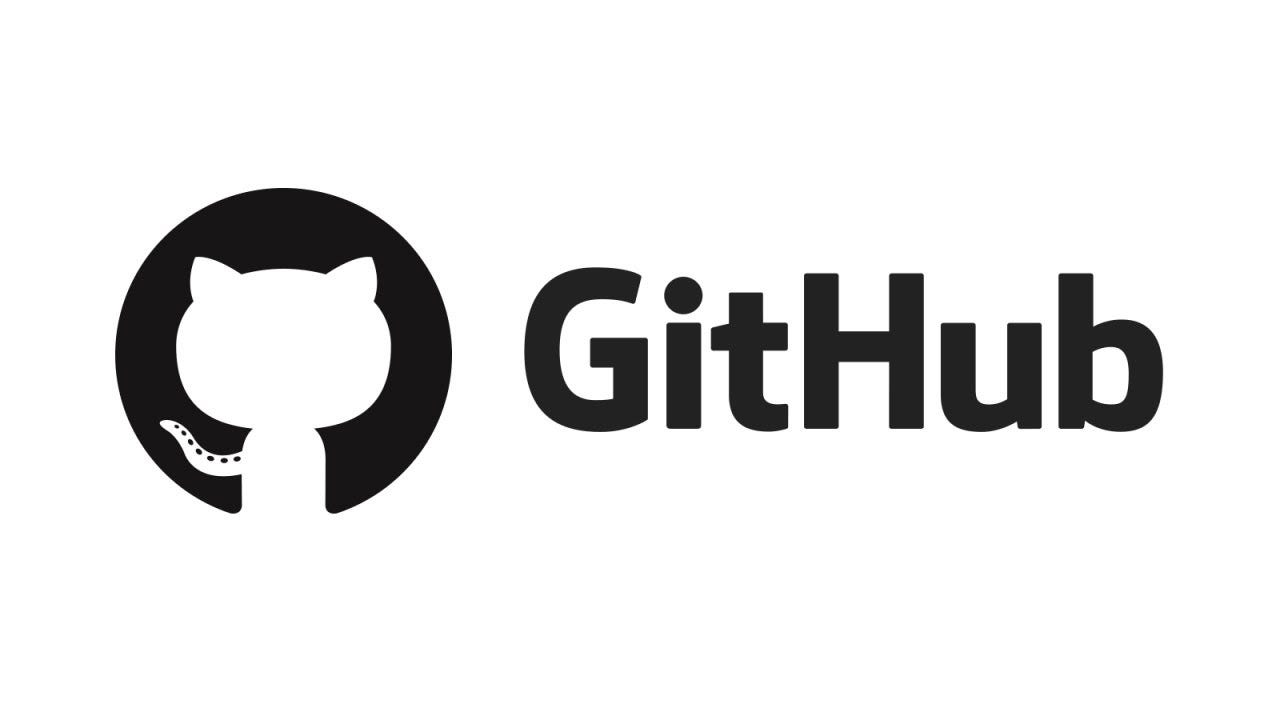"The Power of Community: How Collaboration and Open Source Helped Me Thrive"
Open source and collaboration have played a significant role in the growth and development of my journey. Open source refers to the practice of sharing and collaborating on the development of software and other digital products, with the source code freely available for anyone to use, modify, and distribute. Collaboration, on the other hand, refers to the act of working together with others toward a common goal.
One of the key benefits of open source is that it allows developers to build upon the work of others, rather than starting from scratch. This not only saves time and resources but also enables the creation of more complex and innovative products. For example, the Linux operating system, which powers a large portion of the world's servers and devices, is built on top of several open-source projects. Similarly, the popular web browser Firefox is also built on top of open-source projects such as the Gecko rendering engine.
In addition to saving time and resources, open source also promotes collaboration and community involvement. Developers from all over the world can contribute to open-source projects, which leads to a diverse range of perspectives and ideas. This diversity can lead to more creative and innovative solutions, as well as a stronger sense of community and belonging among contributors.
Collaboration is also essential for the growth and success of open-source projects. By working together, developers can share their knowledge and expertise, as well as their resources and tools. This helps to ensure that open-source projects are of high quality and can meet the needs of their users.
One of the best examples of the power of open source and collaboration is the growth of the internet. The internet is built on open standards and protocols, which have enabled anyone with an internet connection to access and share information with the rest of the world. This has led to the creation of a global network of information and knowledge, which has had a profound impact on society and the way we live our lives.
In conclusion, open source and collaboration have played a crucial role in the growth and development of the technology industry. By allowing developers to build upon the work of others and collaborate towards common goals, open source has enabled the creation of more complex and innovative products, as well as foster a sense of community and belonging among contributors. The internet is a prime example of the power of open source and collaboration, and we can expect to see many more exciting developments in the future as a result of these practices.
Where and how you can also collaborate
Here are many ways to collaborate on open-source projects and engage with communities, including the following:
Join an existing open-source project on a platform like GitHub, where you can fork the repository, make changes, and submit a pull request for review. You can also create your open-source project on GitHub and invite others to contribute.
Attend hackathons, which are events where people come together to work on projects over a short period. Hackathons can be a great way to collaborate on open-source projects and meet other like-minded individuals.
Participate in online communities, such as forums, chat rooms, or social media groups, where you can connect with others who are interested in open source and collaboration. Some examples of online communities for open source and collaboration include Reddit, Stack Overflow, and LinkedIn Groups.
Contribute to open source projects through organizations or initiatives that support and coordinate open source contributions, such as the Open Source Initiative, the Linux Foundation, or Google's Open Source Program Office.
GitHub
Joining an existing open-source project on a platform like GitHub is a common way to collaborate on open-source projects. Here's a step-by-step guide to getting started:
Find a project that interests you and that you would like to contribute to. You can search for open-source projects on GitHub, or you can look for projects that are related to your area of expertise or interests.
Create a GitHub account if you don't already have one. GitHub is a platform that hosts and manages open-source projects, and it provides a range of tools and features to support collaboration.
Fork the repository of the project you want to contribute to. A repository is a collection of files and resources that make up a project. By forking the repository, you create a copy of the project that you can work on without affecting the original.
Clone the forked repository to your local machine. This will allow you to make changes and test your code locally before you submit it for review.
Make changes to the code or resources in the repository as needed. You can add new features, fix bugs, or improve the documentation, depending on the needs of the project and your skills and expertise.
Test your changes to make sure they work as intended. This can involve running the code, reviewing the results, and fixing any issues that arise.
Commit your changes and push them to your fork of the repository. A commit is a snapshot of your changes, and pushing the changes to your fork updates the repository with your changes.
Submit a pull request to the original repository. A pull request is a request for the maintainers of the original repository to review and consider your changes. They may ask you to make additional changes or provide more information before they accept the pull request.
If your pull request is accepted, your changes will be incorporated into the original repository, and you will have contributed to the open-source project. If your pull request is rejected or you decide not to submit it, you can continue to work on your fork of the repository and submit a new pull request later.
Hackathons
Hackathons are events where people come together to work on projects over a short period, often a few days. Hackathons can be a great way to collaborate on open-source projects, as they provide a focused and energizing environment for working on projects. Here's how you can participate in a hackathon:
Find a hackathon that interests you and meets your availability. Hackathons can be in-person or virtual, and they can have a specific theme or focus, such as a particular technology or social issue.
Register for the hackathon if necessary. Some hackathons have a registration process, while others are open to anyone who wants to participate.
Prepare for the hackathon by gathering the necessary resources and tools, such as a laptop, software, and any project materials. You may also want to review the hackathon's guidelines and expectations.
Attend the hackathon and participate in the activities. Hackathons usually involve a mix of workshops, presentations, and project work, and they may have a variety of prizes or awards for the most creative or impactful projects.
Work on an open-source project during the hackathon. You can either join an existing open-source project or create your own, depending on your interests and goals.
Collaborate with others on your project. Hackathons are a great opportunity to meet and work with new people, so be open to working with others and sharing ideas and expertise.
Present your project at the end of the hackathon. Many hackathons have a final presentation or showcase where participants can share their work with others. This can be a great opportunity to get feedback on your project and connect with potential collaborators.
Overall, hackathons can be a fun and rewarding way to collaborate on open-source projects and learn from others. They can also be a great way to network and build your professional skills and connections.
Online communities

Online communities like "WeMakeDev", "Eddiehub" and "4C" are platforms or groups where people with shared interests can connect and communicate with each other. There are many online communities for open source and collaboration, including forums, chat rooms, and social media groups. Here's how you can participate in online communities related to open source and collaboration:
Find an online community that interests you and aligns with your goals and interests. You can search for open-source and collaboration communities on social media platforms, forums, or specialized websites.
Join the community if necessary. Some communities may require you to register or apply to join, while others may be open to anyone interested.
Familiarize yourself with the community's guidelines and expectations. Each community may have its own rules and norms for behavior and communication, so it's important to follow these guidelines to ensure a positive and productive experience.
Introduce yourself and let others know what you are interested in and what you hope to contribute to the community. This can help you connect with others who have similar interests and goals.
Participate in discussions and contribute to the community. You can ask questions, share your own experiences and insights, and provide feedback and support to others.
Collaborate with others on open-source projects. Many online communities provide opportunities to connect with others who are interested in open source and collaboration. You can work on projects together, share resources and expertise, and get feedback on your work.
Online communities can be a great way to connect with others who are interested in open source and collaboration, learn from others, and contribute to the community.
Open Source Projects

There are many organizations and initiatives that support and coordinate open source contributions, including the Open Source Initiative (OSI), the Linux Foundation, and Google's Open Source Program Office. Here's how you can contribute to open-source projects through these organizations:
Find an organization or initiative that aligns with your interests and goals. The OSI, for example, promotes and protects open-source software, while the Linux Foundation supports the development of the Linux operating system and other open-source projects.
Learn about the organization's mission, goals, and programs. This will help you understand the scope and focus of the organization and how you can contribute.
Find open-source projects that the organization supports or coordinates. Many organizations have a list of projects or initiatives that they support, and they may have specific guidelines and expectations for contributions.
Review the project's contribution guidelines and follow the process for submitting changes or contributions. This may involve creating a fork of the repository, making changes, and submitting a pull request for review.
Collaborate with others on the project. Many open-source projects involve contributions from multiple people, and you can work with others to share ideas, coordinate efforts, and review each other's work.
Stay up to date with the project's progress and any new opportunities to contribute. Many open-source projects have a regular release cycle, and they may have ongoing needs for contributions and updates.
Contributing to open-source projects through organizations and initiatives can be a great way to get involved in high-impact projects and make a meaningful contribution to the open-source community.
Communities value in my journey
Participating in online communities has been a valuable experience for me in terms of connecting with others who share my interests and goals, learning from others, and getting feedback on my work.
One of the main benefits of online communities is that they allow you to connect with others who have similar interests and goals, even if you are geographically distant from each other. This can be especially useful if you are working on a niche topic or if you are in an area where there is not a strong local community around your interests. Online communities can provide a sense of belonging and connection that can be hard to find elsewhere.
In addition to connecting with others, online communities can also be a great way to learn from others and get feedback on your work. By participating in discussions, asking questions, and sharing your own experiences and insights, you can learn from others and get valuable feedback on your work. This can help you grow and improve as a professional or enthusiast, and it can also help you build your reputation and credibility within the community.
Overall, participating in online communities has been a rewarding experience for me, and I highly recommend it to others who are looking to connect with others, learn from others, and get feedback on their work.
How Open-Source can play a major role in your career

Open source can play a significant role in advancing your career and professional development, as it can provide opportunities for leadership, exposure, and recognition.
One of the main ways that open source can advance your career is by providing leadership opportunities. By contributing to open-source projects, you can take on leadership roles, such as project maintainer or community leader, which can help you develop your leadership skills and build your reputation. Open source can also provide opportunities for mentorship, where you can share your knowledge and expertise with others and help them grow and develop as professionals.
In addition to leadership opportunities, open source can also provide exposure and recognition for your work. By contributing to open-source projects, you can showcase your skills and expertise to a wider audience, which can help you build your professional network and reputation. Open source can also provide opportunities for recognition, such as awards or accolades, which can help you stand out in the job market and advance your career.
Overall, open source can be a valuable resource for advancing your career and professional development, as it can provide opportunities for leadership, exposure, and recognition. By contributing to open-source projects, you can build your skills, network, and reputation, and make a meaningful contribution to the greater good.
Challenges and how to overcome them

Collaborating on open-source projects and participating in communities can present a range of challenges, including managing conflicts, communicating effectively with team members, and coordinating contributions from different time zones and cultural backgrounds. Here are some best practices for addressing these challenges:
Manage conflicts effectively. Conflicts are a normal part of the collaboration, and they can occur for a variety of reasons, such as differing opinions, misunderstandings, or miscommunication. To manage conflicts effectively, it's important to stay calm, listen to others, and communicate openly and honestly. You can also seek out mediation or other forms of support if needed.
Communicate effectively with team members. Communication is key to successful collaboration, and it's important to keep lines of communication open and clear. This can involve using a variety of communication tools and channels, such as email, chat, or video conferencing, and it can also involve being responsive, respectful, and proactive in your communication.
Coordinate contributions from different time zones and cultural backgrounds. Collaborating with others from different time zones and cultural backgrounds can present challenges, such as coordinating schedules and overcoming language and cultural barriers. To address these challenges, it's important to be flexible, patient, and understanding, and to use tools and strategies that can help you coordinate effectively, such as time zone conversion tools and language translation tools.


